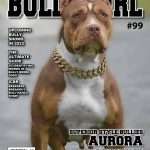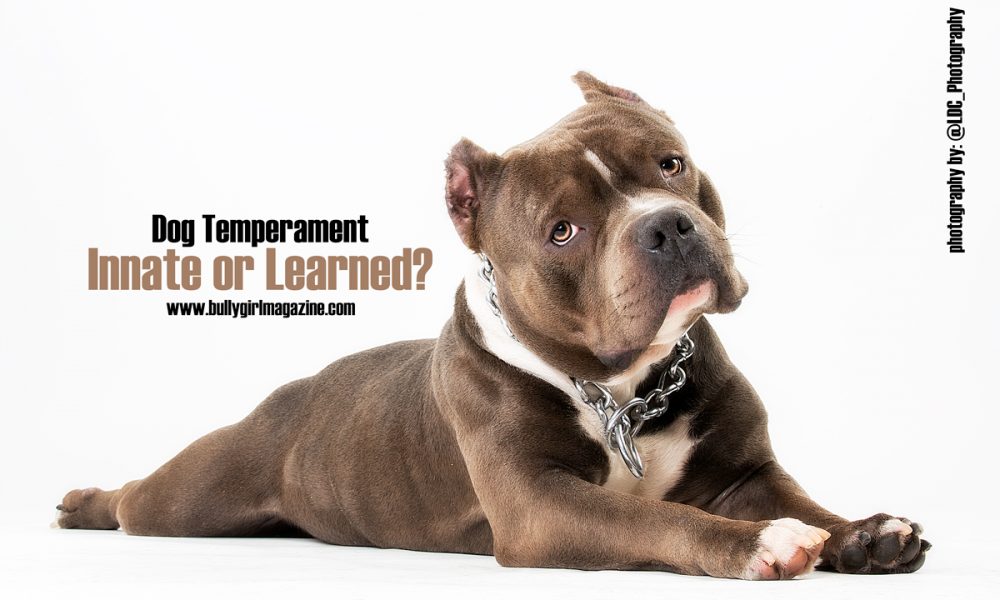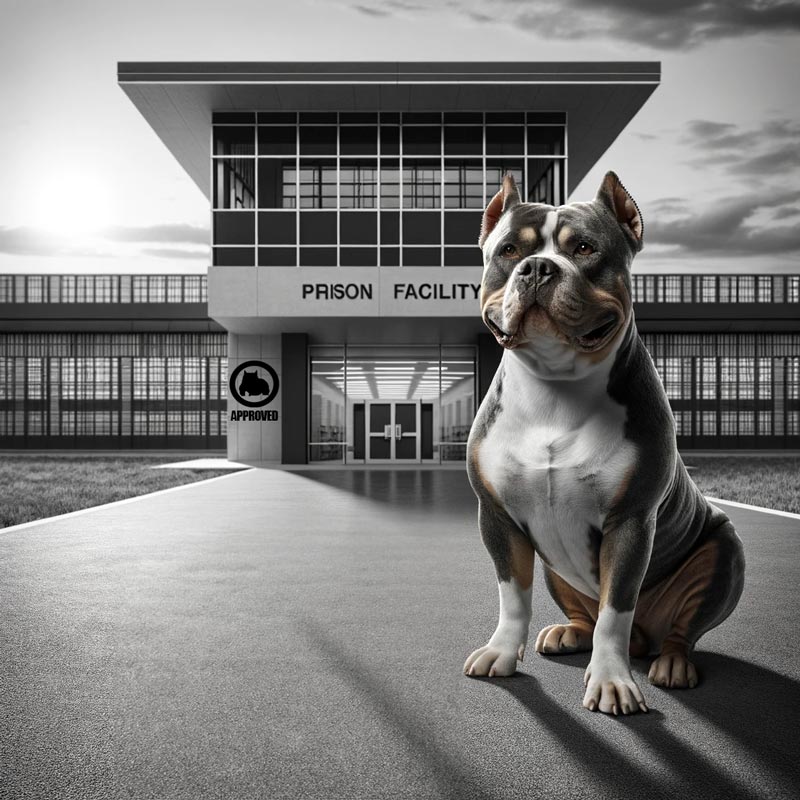You often here the phrase its not the dog, its the owner when it comes to the actions of a dog, especially in the American Bully & Pit bull world. Is a dogs temperament innate or learned? What is temperament?
Temperament can easily be understood to mean the physical and mental characteristics of an individual dog made evident threw their reactions to their environment and any changes within. Some say temperament is 100% genetic, passed down from generation to generation, and is here to stay no matter what life throws at this animal. In other words, your dog will have this exact temperament from the day it born, until the day it dies. Others feel its all about proper socialization and training, and your dog can be molded into a perfect loyal loving companion. I am not here to debate either theory I feel proper socialization and training are essential in a well rounded pet or show dog. However I do feel some characteristics in dogs, just like in humans, can definitely be passed on from generation to generation.
What are the some types of temperament?
If you had to describe your dogs temperament to a potential puppy buyer, or maybe to another dog enthusiast, would you really be able to pick one word to describe their temperament? You’d probably give a blanket answer like he’s great with other dogs, or not so great? This is descriptive but doesn’t really paint a picture of the dog as a whole.
SOUND TEMPERAMENT is a confident and assertive dog. He is very comfortable with himself, and has the curiosity and courage to investigate things he is unsure of. He shows no fear in unknown environments and situations. His general attitude is one of curiosity. If something happens to startle or scare him, he will bounce back to normal rather quickly. These traits make for an excellent pet, or working dog under a strong handler or trainer. However, a strong natured dog such as this may be too independent, for say, an elderly couple looking for a companion to snooze all day with.
UNSOUND TEMPERAMENT is far from calm, they are nervous, fearful and have little confidence. This category can be broken down further.
Sub categories:
SHARP: If your dog is considered to have SHARP TEMPERAMENT, they react immediately to an incident, with no thought of consequence. This type of dog will run from a threat or unknown noise, movement etc. and may not return to the place of the incident at all. There is no curiosity begging at them to return to check it out. This type of dog will bark forever at a shadow it sees every day in the yard. He will never grow used to, or come to trust that shadow. It was always scare him and he will never want to know more about it other then to the bark frantically from a distance. This does not signal a good watch dog, because he will bark at any and everything, and you will be less likely to investigate something he barks at. More so, he is that neighborhood dog, that everyone wishes would get laryngitis especially on a Sunday morning!
SHY: The shy dog is scared of anything it doesn’t know. People, other pets, objects, places, you name it! It is sensitive to noises, movements and will often show fear when confronted with unknowns. Some shyness can be genetic, other shyness can be manmade from improper socialization. It is so important to introduce your puppies and dogs to MANY unknowns. To help overcome shyness and unnecessary fears of silly things, like the kitchen mop.
SHARP SHY: This is little dog syndrome, nailed right on the head. This type of dog is so scared of everything, but his sharp coupled in with his shy, causes him to unthinkingly react with aggression to his fear. This is the dog that will bite you because they don’t understand what you’re doing. After an incident this dog will not bounce back quickly but rather slowly and still fearfully. . Fear= bite, because that is their defense mechanism. They are not cruel, or trying to hurt another pet or human, but they are being defensive in the best way they know how. This can once again be handled and lessened with the proper interaction and socialization to other pets in the house, small children, etc; from when they are puppies. Things that can seem very scary, can easily become friends and allies if your dog is taught from an early age to think of them this way. By keeping a dog separated from children or other animals until he is an adult, he is not going to have any idea what they are or how he should feel towards them, and his fear may lead him to act inappropriately. If taking in an older dog who exhibits these types of attitudes, it would be very important to seek a professional trainer to try to properly introduce the dog, in a way to cause less fear and anxiety. It is not impossible to socialize an older dog, its just more work and knowledge required.
SUBMISSIVE: This dog easily accepts human leadership. He is mild, non threatening and has no desire to be the boss. This is the perfect pet and companion for families, and less experienced dog owners.
Side note: there is a HUGE difference between a dog who has been abused and is submissive in fear of punishment, and a dog who is submissive in the sense that whatever makes you happy makes him happy.
TEMPERAMENTAL: This dogs central nervous system fails to react normally to unknowns, causing it to pee or poop, shake, even bite when stress takes charge. These types of reactions normally will need an extremely experienced hand in identifying stressors, to eliminate them as best from his environment, for the better well being of him and his owner. Not all dogs are for beginners, some require a lot more patience and understanding.
HYPER: You know this guy! He is a never-ending ball of energy constantly moving, jumping, fast-flying, if he could he would walk the ceiling! This hyperness is possibly something he will outgrow, but can also possibly be just his personality, and be here to stay. No matter how much exercise you give him it seems like he will never tire out. This type of dog is not suited for a small space, such as an apartment, or an elderly owner who can easily be knocked down and hurt. You can try to give him “busy jobs”, but moreover a hyper dog usually will just be happier in an environment that allows him to be hyper, like a house with a big back yard, maybe a few kids to play with, or a stay at home pet parent who has extra attention to give him, and has the time to go on a few walks a day.
OVERAGRESSIVE: This dog overreacts to everything. Most often directed at this trainer or handler in protest, because he does not want to do what you are asking of him. He will not calm down easily after an incident, and he isn’t trying to warn you with a nip. He is trying to hurt you to prove he is in control. He does not want to accept a human as his leader. These dogs are not suited to be a family pet. They need extensive professional training, and should only be considered by a very knowledgeable dog-man, willing to put in time.
Understanding a dogs temperament allows you to be a better owner. Dogs just like people have different personalities. If you know what makes your dog tick, it helps make a better living environment for you and them. There is an owner for every temperament, that will love and appreciate that dog for who he is, and who he isn’t. Next time you’re buying a puppy from a breeder and you ask what the parents temperaments are like, don’t settle for a simple answer. Ask detailed questions. Give what if scenarios, so you can have a better understanding of who your bringing home into your life. You may find that although the puppy and parents are adorable, they don’t exactly suit what you are looking for, or they may be more than your able to handle, and that is OKAY! But, it is better to know beforehand, rather than to come home with something you are not equipped to handle.
If more people had a better understanding of temperament, there would be far less dogs ending up in shelters. This also leads into a whole new discussion, that not every dog should be bred. Putting aside whether a dog is show ring quality, or pet quality as far as physical appearance, there are temperament concerns that should always be given just as much consideration, as physical attributes. If you see a negative personality trait present in your dogs, you need to understand that it will be present in their offspring too. Always ask to see a puppies parents, if the owners do not want you to see the parents, this should be a red flag that they are hiding something. No puppy is going to be a mirror image of his parents personalities or temperament, but it is a good place to start. If your puppy comes from generations of obedient dogs, willing to please their owners, you have a good foundation. With proper socialization and training, you will have a well-rounded, fun loving pet. Where if you are starting from a place where there are major issues, with both parents being around other dogs, or children, then chances are your puppy may also have similar issues that will take a far greater hand at training and obedience then you are looking for.
If you enjoyed this article, please share it with a friend, and feel free to leave a comment below!
Thanks for reading.










